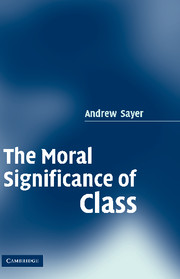Book contents
- Frontmatter
- Contents
- Preface and acknowledgements
- 1 Introduction
- 2 From the habitus to ethical dispositions
- 3 Recognition and distribution
- 4 Concepts of class: clearing the ground
- 5 Struggles of the social field
- 6 Moral and immoral sentiments and class
- 7 Responses to class I: egalitarianism, respect(ability), class pride and moral boundary drawing
- 8 Responses to class II: explanations, justifications and embarrassment
- 9 Conclusions and implications
- Bibliography
- Index
Preface and acknowledgements
Published online by Cambridge University Press: 22 September 2009
- Frontmatter
- Contents
- Preface and acknowledgements
- 1 Introduction
- 2 From the habitus to ethical dispositions
- 3 Recognition and distribution
- 4 Concepts of class: clearing the ground
- 5 Struggles of the social field
- 6 Moral and immoral sentiments and class
- 7 Responses to class I: egalitarianism, respect(ability), class pride and moral boundary drawing
- 8 Responses to class II: explanations, justifications and embarrassment
- 9 Conclusions and implications
- Bibliography
- Index
Summary
I was tempted to call this book ‘Think You're Better Than Us, Do You?’, as that challenge, real or imagined, gets to the heart of the moral significance of class in everyday life. Class is not a reflection of moral worth or needs, and its relationship to merit is zero in childhood and more cause than effect later. Yet since class fundamentally affects the kind and quality of life we can lead its legitimacy is in question. This is what gives class its moral significance, not simply as a matter for moral and political philosophers to consider, but for our daily lived experience, in terms of how people treat and value one another. For all the many books on class in social science, remarkably few of them analyse the moral dimension of class. This is because of the wider problem, particularly in sociology, of what Axel Honneth terms ‘anti-normativism’, which renders opaque the evaluative character of our relationship to the world. In particular our concerns – the things that matter to us for our well-being, the things which we value and care about – are either ignored or dealt with in an alienated and alienating way which fails to identify why they matter so much.
Although this book is very much about the moral texture of everyday, lay, experience, I shall use concepts and analyses from philosophical literature on ethics – much of it normative – as well as sociology, to interpret lay responses to class.
- Type
- Chapter
- Information
- The Moral Significance of Class , pp. vii - viiiPublisher: Cambridge University PressPrint publication year: 2005



